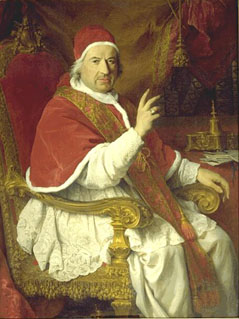Pope Benedict XIV
Benedict XIV ( Prospero Lorenzo Lambertini actually or Prosper Lambertini; * March 31, 1675 in Bologna, Papal States, † May 3, 1758 in Rome) was Pope from 1740 to 1758.
Life
Born into an impoverished nobility, Lambertini worked since 1701 at the Curia. From 1727 Archbishop of Ancona, he was in 1728 by Pope Benedict XIII. elevated to cardinal. It was allocated in Gerusalemme the titular church of Santa Croce; In 1731 he became archbishop of his native city of Bologna. On August 17, 1740, the major church lawyer and historian, was chosen after a difficult, lasting about half a year conclave as pope.
As Pope, he modernized the Curia, the sacrament law and the monastic orders. He was an opponent of the Jesuits. Their supranational influence in many states and their extensive education was particularly the Catholic monarchs a nuisance. However, at the Jesuit ban only came in 1773.
Despite his friendly relationship with the very sober set in issues of Lodovico Antonio Muratori Marian devotion, Benedict XIV proved to be a promoter of devotion to Mary. In its decision issued on September 27, 1748 "Papal Bull" Gloriosae Dominae he explains, the veneration of Mary was founded in the will of God, and acknowledges the Marian Congregations as an excellent means to holiness. In his work De servorum Dei Beatificatione he called the Miterlöserschaft Mary as orthodox (II c. 32). About the liturgical veneration of Mary, he gives his De Festis Christi Mariae Virginis et Beatae. Despite the reduction in ecclesiastical feast days he allowed in 1751 a celebration of Mary's motherhood. In 1752 he also allowed the celebration of the feast of the Immaculate Conception of Mary in the papal chapel. A planned bull Mulierem pulchram that expressed the doctrine of the Immaculate Conception, but remained unpublished.
Papal policy
Benedict XIV concluded concordats with several European countries, in which he willing to compromise concessions made without departing from the principles of Catholicism. He was widely accepted in European intellectual world as an intellectual. As the first pope he used in his teaching in the form of the encyclical ( instructive explanatory circular to the bishops ), the first Ubi primum 1740 he authored.
As the first Pope in 1748, he realized to the Prussian royal title. He also officially lifted the ban on the teaching of Copernicus. On the other hand, it intensified in 1751 in his bull Providas Romanorum penalties against Freemasonry that. Already by his predecessor, Clement XII had been provided in the bull In eminenti Apostolatus specula.
In his addressed to the senior clergy of Italy encyclical Vix pervenit Pope Benedict turned massively against interest and usury. In § 3, paragraph I of this letter states: " The sin usura means and in the loan contract has its real seat and origin, based on the fact that someone from the loan back demands for even more than the other of him having received [ ... ] Any profit that exceeds the borrowed sum, therefore, is illicit and usurious. "
In the Bull Beatus Andreas, he allowed the worship of Anderl von Rinn and thus legitimized the anti-Semitic blood libel about him.
Benedict XIV ranks as a great modernizer of Rome. Both the renewal of lagging infrastructure was initiated by him as well as the artistic and intellectual flowering of the city. He supported the establishment of foreign cultural academies, built libraries, lifted the ban on performance over the Roman theater and reformed the universities. The completion of the Trevi Fountain, the renovation of old buildings and the beginning of the draining of the Pontine Marshes go back on his statement. On May 3, 1758, he died in Rome.









